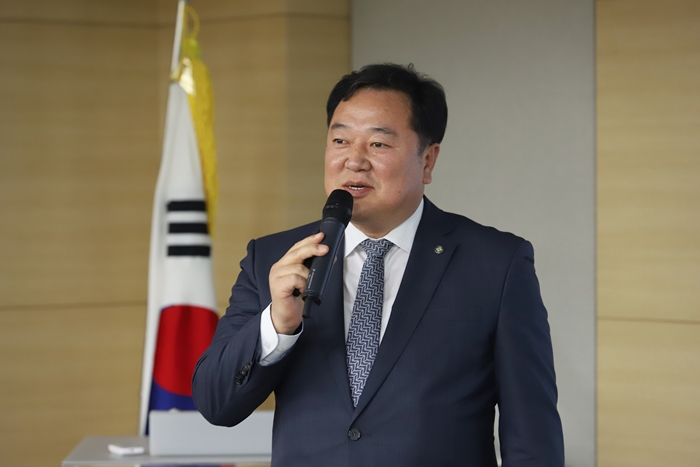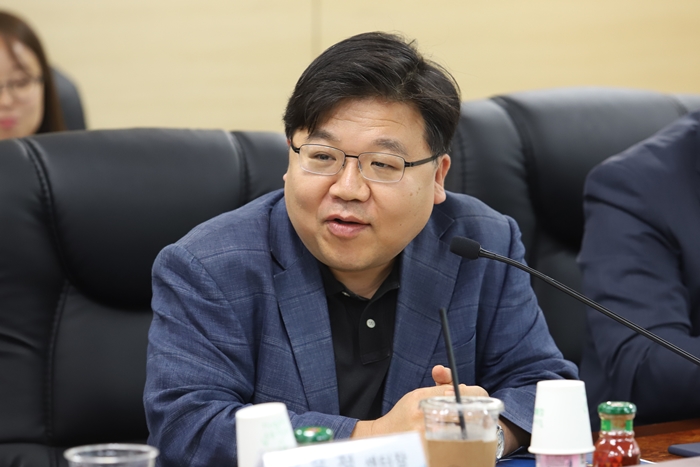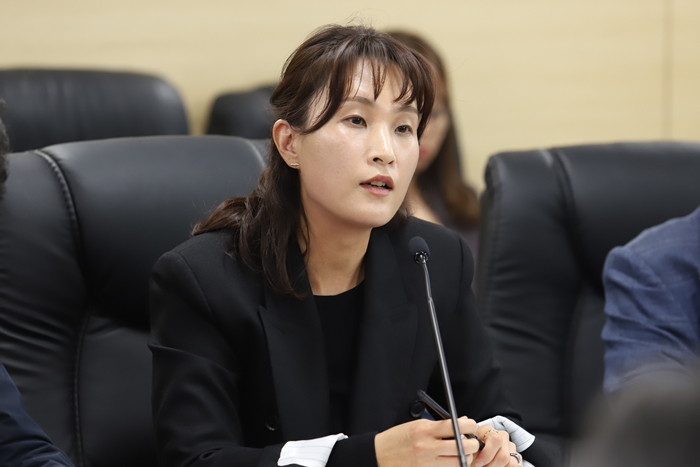News & Event


News & Event
News & Event
[The 113th KISTEP Wednesday Forum] The Way to Strengthen Global Power in Bio-health
- Writer Yeory Lim
- Date2019-10-17
- Hit1,320
KISTEP held the 113th KISTEP Wednesday Forum with the theme of ‘The Way to Strengthen Global Power in Bio-health’ on 16th October, 2019.
Korea government selected bio-health as the Big 3 new industries along with future cars and system semiconductors, and presented the government budget proposal in 2020 that invests 4.7 trillion won to those industries. With the ‘Innovation strategies for bio-health industry’ among new industry development plans, it is planned to foster the bio-health industry as a next-generation key industry by increasing the global market share by 3 times by 2030, reaching 50 billion dollars of exportation, and generating 300 thousands jobs. The current global market share of Korea in bio-health is 1.8% and the export scale is 14.4 billion dollars, so appropriate plans, such as technology developments, improvement in regulations, and development of innovation ecosystem, are required to reach innovation strategy targets. Therefore the forum was prepared to review the current status of domestic bio-health industries and to seek policy alternatives for Korea to take a leap as a global leader in bio-health.
Korea government selected bio-health as the Big 3 new industries along with future cars and system semiconductors, and presented the government budget proposal in 2020 that invests 4.7 trillion won to those industries. With the ‘Innovation strategies for bio-health industry’ among new industry development plans, it is planned to foster the bio-health industry as a next-generation key industry by increasing the global market share by 3 times by 2030, reaching 50 billion dollars of exportation, and generating 300 thousands jobs. The current global market share of Korea in bio-health is 1.8% and the export scale is 14.4 billion dollars, so appropriate plans, such as technology developments, improvement in regulations, and development of innovation ecosystem, are required to reach innovation strategy targets. Therefore the forum was prepared to review the current status of domestic bio-health industries and to seek policy alternatives for Korea to take a leap as a global leader in bio-health.

▲ Sang-seon Kim (President, KISTEP)
The forum began with the opening address by Sang-seon Kim (President, KISTEP) and followed the presentations of Jang Seong Kim (President, Korea Research Institute of Bioscience & Biotechnology), and panel discussion with Jung Seob Shin (Executive director, Life Science & Healthcare Investment Group, KB Investment) and Eun-Jung Kim (Director, Center of Bio & Basic Science R&D Coordination, KISTEP) and open floor discussion followed.

▲ Jang Seong Kim (President, Korea Research Institute of Bioscience & Biotechnology)
Firstly, president Kim summarized mega-trend and future issues that cover Korean and the whole world, and clarified the OECD’s forecast that bio-economy will emerge from those future issues. Also, he explained the concept of bio-economy defined by OECD, United States, and EU, and suggested that bio-health technologies will solve difficult problems from various areas.
Next, he explained the shift of bio-health paradigm. In 1950s, the DNA double-helix structure was determined, and it allowed us to understand life from hardware prospective. In 2003, the completion of the human genome project helped us to understand life from software prospective, then scientists and engineers started to modify·produce the softwares using the techniques such as synthetic biology and genome editing in 2010s. Moreover, he argued that the paradigm was shifted from the reductionist approach, that the entire system can be understood by investigating each part and combining them together, to the integrated approach that uses big data and mathematical models. He added that new technologies, such as gene scissors, stem cell therapies Organoid, and gene therapies, emerged from the shift, and the R&D paradigm was also shifted from silos to open innovative R&D.
President Kim briefly organized competitions in bio-economy of each country of the world, and continued to present the status of bio-health industries of Korea. First of all, he mentioned that the Korea’s share in global bio-medicine and medical supplies markets stands at 1.2 percent (10 billion dollars), only 0.65% of GDP, which is significantly lower than the ICT industry’s 22.88 percent share of GDP. Moreover, he explained the needs to expand the size of current domestic bio-industry about 100 times in order to become a ‘Bio-entry country’ that covers 30 percent of GDP by 2030. Then he pointed the barriers of domestic bio-industry development as ▲an absolute small size of domestic markets, ▲a shortage of suitable human resources, ▲high dependence on government R&D, and ▲technology-lagging regulations. In order to overcome those factors, he suggested to revise Law for the Promotion of Biotechnology, to strengthen pan-ministerial policy coordination mechanism, to draw private investments by supporting regional clusters to improve its competitiveness, and to manage nationwide Bio Big Data. Lastly, he emphasized that government- and stakeholder-centered regulations should be innovated to scientist-centered regulations that have consistent standards based on rationale.

▲ Jung Seob Shin (Executive director, Life Science & Healthcare Investment Group, KB Investment)
In panel discussion, executive director Shin said that “Bio is not far away, it is just myself.” and suggested that “Bio-industry eventually will have extremely segmented markets that target each individual, and it is a growth factor for bio-industry.” Furthermore, he mentioned that the competitiveness of bio-industry depends on R&D and emphasized that “The industrial application of bio-industry, with combination of advanced scientific performances and adventurous capital, allows small and medium-sized enterprises to have competitiveness in bio-markets.” Lastly, he pointed that the government investments should concentrate on autonomous and creative R&D, and open a door for public opening and being listed on KOSDAQ, however, companies with problems, such as data manipulation issues, should be removed with one strike-out policy. Regulations should be expectable, and high capacity in regulatory science should be fostered to develop preemptive regulations by concentrating government support.

▲ Eun-Jung Kim (Director, Center of Bio & Basic Science R&D Coordination, KISTEP)
Director Kim argued that “Bio-health industry can emerge when innovative technologies and capital investments are combined, and it is a meaningful implication in bio-health industry that recent VC investment in bio-health is sharply increased.” Also, she mentioned that “The R&D investment was increased up to 24 trillion won in 2020, and the investment in bio-health was also increased by 15%” and she clarified that “Apart from the previous investments, that concentrated on infrastructures for securing technologies and improving the level, investments in bio-health will concentrate on building innovative·industrial ecosystem.” Then she added that expansion of industry·university·research institute consortium and businesses with pan-ministerial·total periodic supports will have fresh start in 2020. As regulations should eventually be solved by regulatory authorities, government branches and research institutes, except regulatory authorities, should try hard for enhancing the public acceptance of bio-health technologies. Lastly, she emphasized that “Providing correct information to public and obtaining support for bio-health by arranging a place for public to experience the advantages of bio-health technologies are the way for regulation improvement after all.”
